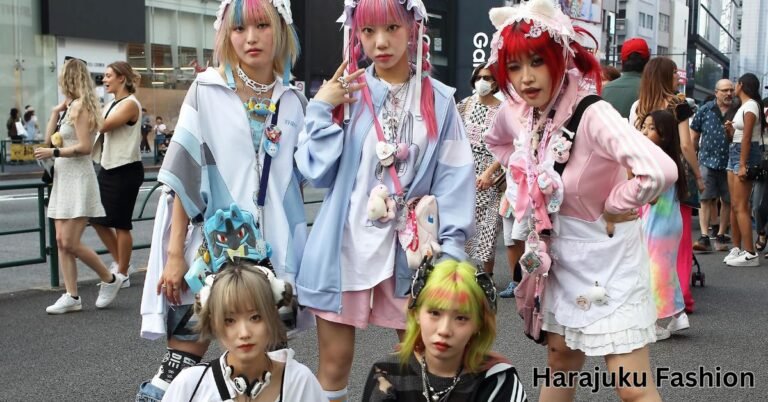‘sHarajuku, a vibrant district in Tokyo, is renowned worldwide for its eclectic fashion scene. Emerging in the 1980s, this unique style movement combines various influences, creating a colorful tapestry of self-expression that continues to evolve. In this article, we will explore the essence of Harajuku fashion’s, its history, key styles, and its significance as an art form.
Table of Contents
ToggleThe Origins of Harajuku Fashion
Historical Context
Harajuku’s fashion culture can be traced back to the post-World War II era, when Western influences began to permeate Japanese society. In the 1980s, the youth of Tokyo began to embrace these influences, leading to the birth of what we now recognize as Harajuku fashion’s.
The Birthplace: Takeshita Street
Takeshita Street, the heart of Harajuku, became a hub for fashion enthusiasts. This narrow street is lined with shops, boutiques, and cafes, each offering a diverse range of styles. Here, young people gathered to showcase their creativity and individuality, turning the street into a vibrant fashion runway.
Key Styles in Harajuku Fashion
Lolita Fashion
One of the most recognizable styles, Lolita fashion draws inspiration from Victorian and Rococo aesthetics. Characterized by its frilly dresses, petticoats, and elaborate accessories, Lolita fashion emphasizes modesty and femininity. This subculture often features intricate patterns and pastel colors, creating a doll-like appearance.
Gyaru
Gyaru, meaning “girl” in English, is a style that embodies a carefree and rebellious spirit. This fashion movement is known for its bold, flashy outfits, exaggerated hairstyles, and dramatic makeup. Gyaru often incorporates elements like platform shoes and vibrant colors, making it a standout choice among Harajuku enthusiasts.
Visual Kei
Visual Kei is more than just fashion; it’s a musical movement that blends music, performance, and aesthetics. Artists often dress in extravagant costumes, featuring dramatic hairstyles and makeup. This style embraces gender fluidity and challenges traditional notions of masculinity and femininity, making it a powerful form of self-expression.
Streetwear
In recent years, streetwear has emerged as a dominant trend in Harajuku. Characterized by casual yet stylish clothing, streetwear incorporates elements from hip-hop culture, skateboarding, and punk influences. Brands like A Bathing Ape and Supreme have gained popularity, contributing to the global recognition of Harajuku fashion.
The Significance of Harajuku Fashion
A Canvas for Self-Expression
At its core, Harajuku fashion’s is about individuality and self-expression. In a society where conformity is often the norm, the youth of Harajuku challenge societal expectations through their unique styles. Each outfit tells a story, reflecting the wearer’s personality, beliefs, and aspirations.
Cultural Impact
Harajuku fashion’s has significantly influenced global fashion trends. Designers, brands, and influencers have drawn inspiration from this vibrant culture, incorporating Harajuku aesthetics into their collections. The fusion of Japanese street style with Western fashion has created a unique dialogue between cultures, pushing the boundaries of creativity.
Community and Belonging
The Harajuku fashion’s scene fosters a sense of community among its followers. Fashion shows, events, and gatherings provide platforms for individuals to connect, share ideas, and celebrate their love for style. This sense of belonging is vital for many, especially in a world that often promotes isolation.
The Future of Harajuku Fashion
Evolving Trends
As with any fashion movement, Harajuku is constantly evolving. The rise of social media has played a significant role in shaping current trends, allowing for greater visibility and collaboration among fashion enthusiasts. Platforms like Instagram and TikTok have enabled the spread of Harajuku aesthetics beyond Japan, attracting a global audience.
Sustainability and Ethical Fashion
With increasing awareness of environmental issues, the future of Harajuku fashion may also lean towards sustainability. Many young designers are exploring eco-friendly materials and ethical production methods, merging creativity with responsibility. This shift reflects a growing consciousness among consumers who seek to support sustainable practices in the fashion industry.
How to Embrace Harajuku Fashion
Explore Your Style
If you’re inspired by Harajuku fashion, start by exploring various styles and finding what resonates with you. Experiment with different colors, patterns, and accessories to create a look that reflects your personality.
Thrift and Vintage Shopping
Thrift and vintage shops are treasure troves for unique clothing items. Harajuku fashion often emphasizes individuality, so seek out one-of-a-kind pieces that allow you to stand out from the crowd.
DIY Fashion
Creating your own clothing and accessories is a fun way to express your creativity. Embrace the DIY spirit that is prevalent in Harajuku culture, whether it’s customizing a jacket with patches or designing your own jewelry.
Conclusion
Harajuku fashion’s is a dynamic expression of creativity, individuality, and cultural exchange. From its humble beginnings on the streets of Tokyo to its global influence today, this vibrant fashion scene continues to inspire and empower. By embracing the art of self-expression through fashion, individuals can celebrate their uniqueness and contribute to the rich tapestry of Harajuku culture.
As the world of fashion continues to evolve, Harajuku will undoubtedly remain a beacon of inspiration, encouraging everyone to express their true selves through the art of style. Whether you’re drawn to the whimsical Lolita dresses, the bold Gyaru looks, or the edgy Visual Kei ensembles, there’s a place for everyone in the colorful world of Harajuku fashion. So, step out, be bold, and let your style shine.

